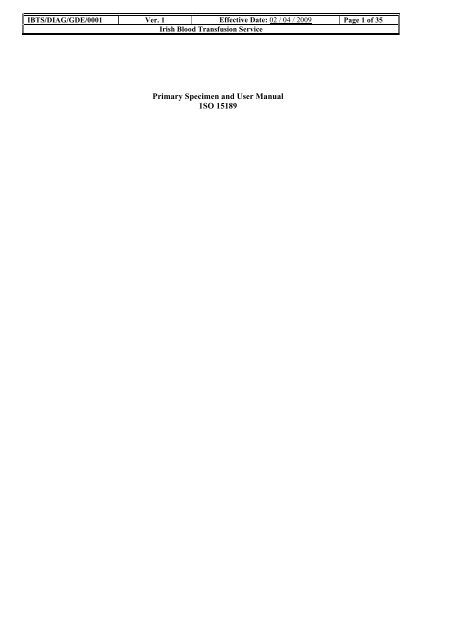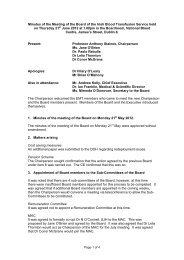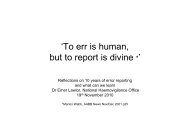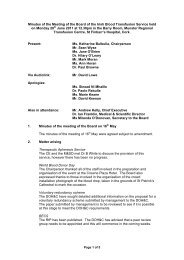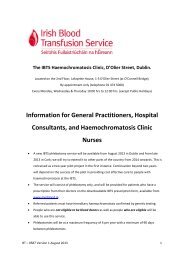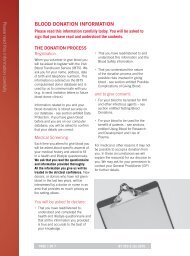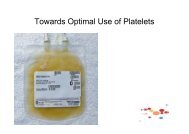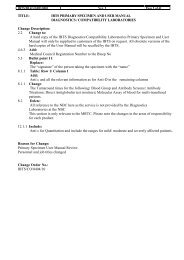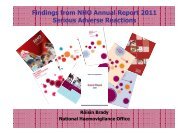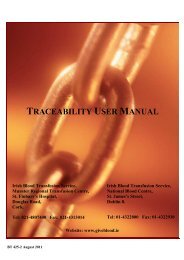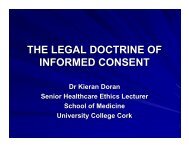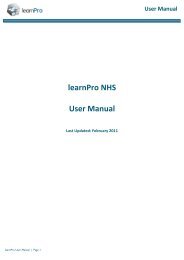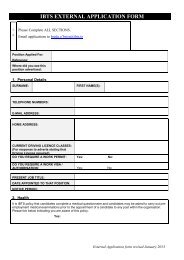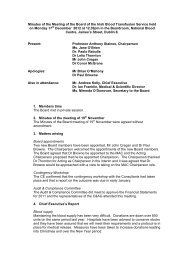Primary Specimen & User Manual - Irish Blood Transfusion Service
Primary Specimen & User Manual - Irish Blood Transfusion Service
Primary Specimen & User Manual - Irish Blood Transfusion Service
Create successful ePaper yourself
Turn your PDF publications into a flip-book with our unique Google optimized e-Paper software.
IBTS/DIAG/GDE/0001 Ver. 1 Effective Date: 02 / 04 / 2009 Page 1 of 35<strong>Irish</strong> <strong>Blood</strong> <strong>Transfusion</strong> <strong>Service</strong><strong>Primary</strong> <strong>Specimen</strong> and <strong>User</strong> <strong>Manual</strong>1SO 15189
IBTS/DIAG/GDE/0001 Ver. 1 Effective Date: 02 / 04 / 2009 Page 2 of 35<strong>Irish</strong> <strong>Blood</strong> <strong>Transfusion</strong> <strong>Service</strong>CONTENTSPAGE1.0 Introduction ………………………………………………………………………………. 4 - 52.0 Guide to Using this <strong>Manual</strong> ……………………………………………………………... 53.0 Quality Policy ……………………………………………………………………………. 54.0 General Information ……………………………………………………………………... 6 - 84.1 Laboratory Directors … …………………………………………………………… 64.2 IBTS Laboratory Personnel –Medical/Medical Scientific ………..…………………… 64.3 <strong>Service</strong> Operating Times ………………………………………………………….. 64.4 <strong>Specimen</strong> Scheduling ……………………………………………………………… 64.5 Diagnostics/Compatibility Laboratories Contact Details …………………………… 74.6 Contacting the Diagnostics/Compatibility Laboratory with an Urgent Request forEmergency <strong>Service</strong>s……………………………………………………………….. 74.6.1 Routine Hours ……………………………………………………………………… 74.6.2 Out of Hours ……………………………………………………………………… 74.6.3 Procedure to be Followed for Urgent Request ……………………………………… 84.7 <strong>Service</strong> Fees and Charges ……................................................................................... 85.0 Laboratory Request Forms, <strong>Specimen</strong> Bottles and Containers …………………………… 8 - 155.1 General Information Re: <strong>Specimen</strong> Collection...……………………………..………… 85.2 Categories of Request Forms available at the IBTS ………………………………….. 95.2.1 Process for Ordering the IBTS Request Forms ………………………………………… 95.3 Completion of Request Forms …………………………………………….. 9 - 105.4 Labelling the <strong>Specimen</strong> ……………………………………………………………….. 105.4.1 Mandatory Requirements ……………………………………………………………… 105.4.2 Labels on <strong>Specimen</strong> Bottles ……………………………………………………………. 105.4.3 Requirement to sign the declaration …………………………………………………… 105.5 Exceptions ……………………………………………………………………………… 115.6 Quality of <strong>Blood</strong> <strong>Specimen</strong>s (Vis-à-Vis Condition and Timing) ……………………….. 115.6.1 Timing of <strong>Specimen</strong> Collection in Relation to Previous <strong>Transfusion</strong>s ………………….... 115.6.2 Crossmatching Requests, Reference <strong>Specimen</strong>s ………………………………………… 115.7 Non-Conforming <strong>Specimen</strong> Bottles, Forms or <strong>Specimen</strong> Quality Issues........................... 125.7.1 <strong>Specimen</strong>s: Condition/Documentation and Appearance/Quality Issues………………… 12 - 135.7.2 <strong>Specimen</strong> Request Form Issues ………………………………………………………… 145.7.3 General Information Re: <strong>Specimen</strong>s and Forms …............................................................ 14 - 156.0 Delivery, Packaging, Storage and Transport Requirements of Diagnostic <strong>Specimen</strong>s ……... 15 - 166.1 <strong>Specimen</strong> Delivery ……………………………………………………………………… 156.2 <strong>Specimen</strong> Packaging and Transport ……………………………………………………… 156.2.1 International Carriage of Dangerous Goods by Road ……………………………………. 156.2.2 Universal Packaging Procedure for the Transport of Diagnostic <strong>Specimen</strong>s ……....…… 156.2.3 Disposal of Waste Material Used in <strong>Specimen</strong> Collection ……………………………….. 166.3 Storage of <strong>Specimen</strong>s …………………………………………………………………….. 166.4 Delivery of Routine Diagnostic <strong>Specimen</strong>s:-Out of Hours ……………….………….…… 167.0 External and Internal Quality Assessment Programmes ……………………………………… 16 - 177.1 External Quality Assessment Programmes ………………………………………………. 167.2 Internal Quality Assessment Programmes ……………………………………………… 167.3 Outcome of a Major Non-Conformance …………………………………………………. 17
IBTS/DIAG/GDE/0001 Ver. 1 Effective Date: 02 / 04 / 2009 Page 3 of 35<strong>Irish</strong> <strong>Blood</strong> <strong>Transfusion</strong> <strong>Service</strong>8.0 Laboratory Tests and <strong>Service</strong>s .....................................................................................................17 - 258.1 The <strong>Service</strong>s Provided by the IBTS Diagnostics Laboratories ……………………… 178.1.1 Test Profiles and Turnaround Times …………………………………………………….. 18 - 228.2 Provision of <strong>Blood</strong>/<strong>Blood</strong> Components …………………………………………………. 238.2.1 Provision of Red Cells (Stock)……………………………………………………………. 238.2.2 Provision of Platelet Components ……………………………………………………… 248.2.3 Provision of Rare Donor Red Cells from International Rare <strong>Blood</strong> Programmes ……… 248.3 Consultancy and Pathology <strong>Service</strong>s ……………………………………………………… 248.4 Haemovigilance <strong>Service</strong> …………………………………………………………………. 248.5 Repeat Examination due to Analytical Failure or Further Examination of the <strong>Primary</strong><strong>Specimen</strong> ………………………………………………………………………………….. 258.5.1 Repeat Examination due to Analytical Failure …………………………………………… 258.5.2 Further Examination of the <strong>Primary</strong> <strong>Specimen</strong> …………………………………………… 258.5.3 Referring specimens to an external laboratory for further investigations ……………… 258.6 External Laboratory Testing ……………………………………………………………… 259.0 Reporting of Test Results ………………………………………………………………………… 25 - 269.1 Approval of Test Results and Issuing Reports ……………………………………………. 25 - 269.2 Issuing Reports on Critical <strong>Specimen</strong>s where the Results are delayed …………………… 269.3 Reporting of Results by Fax ………………………………………………………………. 269.4 Telephoned Results ………………………………………………………………………... 269.5 Archiving of Patients Records …………………………………………………………….. 2610.0 Review and Assessment of Customer Satisfaction ……………………………………………... 27 - 2810.1 <strong>Service</strong> Level Agreements……………………………………………………………… 2710.2 Customer Complaints ……………………………………………………………………... 2710.3 Quality Management Review………………....………………………………………….. 2710.4 Annual <strong>User</strong> Symposium ………………………………………………………………….. 2810.5 Hospital <strong>Transfusion</strong> Committees……………………………………………………….. 2810.6 Continuous Improvement ………………………………………………………………….. 2811.0 Traceability and reporting of Serious Adverse Reactions (SARs) andSerious Adverse Events (SAEs) ………………………………………………………………......28 - 3011.1 Traceability ………………………………………………………………………………. 2811.2 Serious Adverse Reactions and Serious Adverse Events…………………………………. 29 - 3012.0 Guidelines: Medical/Scientific …………………………………………………………………… 30 - 3312.1 Ante-Natal Guidelines …………………………………………………………………….. 3112.1.1 <strong>Specimen</strong>s for Anti-D Quantitation ……………………………………………………….. 3112.1.2 Ante-Natal <strong>Specimen</strong>s for Antibody Titration …………………………………………… 3112.2 Guidelines for the Collection of <strong>Specimen</strong>s from Previously Transfused Patients …….... 3212.3 Guidelines for the Storage of <strong>Specimen</strong>s: Pre Testing ……………………………………. 3212.4 Guidelines for Storage of Examined <strong>Specimen</strong>s for Archive and Look Back Purposes ….. 3212.5 Guidelines for Processing <strong>Specimen</strong>s with Special Requirements Outside of theRoutine Working Day ……………………………………………………………………... 3312.5.1 Non Compliance with the Turnaround Times …………………………………………….. 3313.0 Index of Tests and <strong>Service</strong>s Provided ……………………………………………………………. 34 - 3513.1 Tests……………………………………………………………………………………… 34 - 3513.2 <strong>Service</strong>s ……………………………………………………………………………………. 35
IBTS/DIAG/GDE/0001 Ver. 1 Effective Date: 02 / 04 / 2009 Page 4 of 35<strong>Irish</strong> <strong>Blood</strong> <strong>Transfusion</strong> <strong>Service</strong>TITLE:IBTS PRIMARY SPECIMEN AND USER MANUALDIAGNOSTICS / COMPATIBILITY LABORATORIES1.0 INTRODUCTION1.1 This manual is designed to provide an overview of the services available from thediagnostics / compatibility laboratories of the IBTS.This manual is intended for both the users of the routine diagnostics / compatibility servicesand of the reference immunohaematology service.1.2 Section 8.1 of this manual identifies the services provided by the IBTS diagnostic/compatibilitylaboratories to their customers/users: namely the hospitals, hospital blood banks and medicalpractitioners in the public and private health care sectors.1.3 This manual specifies the minimum requirements for the labelling of specimens and for thecompletion of request forms to ensure sufficient information is received for the requestedservice to be optimally delivered.This manual is a controlled document as part of the IBTS Quality Management System.1.4 All diagnostics /compatibility services undergo continuous review through quality assuranceand audit activities. The laboratories are committed to obtaining and maintaining theInternational Standard ISO 15189 (current version).1. 5 The IBTS diagnostics /compatibility laboratories are committed to compliance to S1 547 of2006 incorporating Articles 14 and 15 of Directive 98/ 2002/EC (Traceability Requirements,Notification of SAR/E).1.6 The IBTS diagnostics /compatibility laboratories are subject to regular scheduledinspection by the IMB for compliance as a <strong>Blood</strong> Establishment to the relevant EUDirectives and <strong>Irish</strong> Statutory Instruments (SI 360 of 2005,SI 547 of 2006, SI 562 of 2006)1. 7 The IBTS diagnostics / compatibility laboratories use CE marked IVD kits, controls andreagents in accordance with manufacturer’s instructions .Likewise all validated technologyand systems used are CE marked with the appropriate documentation supplied.1.8 <strong>Specimen</strong>s are disposed of by IBTS in accordance with IBTS Health and Safety proceduresand, in compliance with waste management regulations.1.9 The IBTS diagnostics /compatibility laboratories use validated methods and procedures.Where the IBTS laboratories intend to change a testing procedure such that the results ortheir interpretation could be significantly different, users will be notified in writing.1.10 The IBTS operates a calibration and maintenance schedule for all equipment.1.11 The IBTS will accept correctly completed blood request forms / service requests fromdesignated facilities requesting its service provided the pertinent details are completed and thespecimens accompanying the forms meet the current specified criteria.Authorised personnel will review test request documentation to determine suitability of testsrequested (standard investigations, reference investigations and urgent requests).
IBTS/DIAG/GDE/0001 Ver. 1 Effective Date: 02 / 04 / 2009 Page 5 of 35<strong>Irish</strong> <strong>Blood</strong> <strong>Transfusion</strong> <strong>Service</strong>1.12 The IBTS diagnostics /compatibility laboratories operate to internal policies and proceduresfor all activities as defined by the IBTS Quality Management System.1.13 IBTS laboratory management is committed to• Staff recruitment, training, development and retention at all levels to provide a full andeffective service to its users.• The proper procurement, validation and maintenance of such equipment and otherresources as are needed for the provision of the service.• The handling of all specimens in such a way as to ensure specimen integrity andthereby the correct performance of laboratory examinations.• The use of accredited examination procedures and methods that will ensure the highestachievable quality of all tests performed.• Reporting results of examinations in ways which are timely, confidential, accurate andclinically useful.• The assessment of user satisfaction, in addition to internal audit and external qualityassessment, in order to effect continual quality improvement.• Notification to users of significant changes to IBTS diagnostics /compatibilitylaboratories process’s/ procedures prior to implementation.2.0 GUIDE TO USING THIS MANUAL2.1 A copy of this manual is available on the internet,www.giveblood.ie under ‘Clinical <strong>Service</strong>s’ – ‘Clinical and Diagnostic <strong>Service</strong>s’ –‘Antenatal / Compatibility <strong>Service</strong>s’ – ‘ <strong>Primary</strong> <strong>Specimen</strong> and <strong>User</strong> <strong>Manual</strong>”2.2 A hard copy of the IBTS Diagnostic / Compatibility Laboratories <strong>Primary</strong> <strong>Specimen</strong> and<strong>User</strong> <strong>Manual</strong> will be supplied to customers of the IBTS2.3 When key changes are made to either the tests or the services identified in this manual, thecustomer will be notified in writing. The electronic copy of the manual will be modified andmade available to the customer. The hospital hard copy will be withdrawn and returned tothe IBTS.3.0 QUALITY POLICY3.1 In order to ensure that the needs and requirements of users (and ultimately patient’s needs)are appropriately met the IBTS diagnostics/compatibility laboratories will:• Operate a Quality Management System to integrate the organizations procedures,processes and resources in the laboratories, in compliance with the Quality <strong>Manual</strong>.• Set quality objectives and plans in order to implement the Quality Policy (as definedin IBTS Quality Policy Statement).• Ensure that all staff are familiar with this quality policy to ensure user satisfaction.• Commit to the health, safety and welfare of its entire staff. These laboratories areunsuited to visitors in order to minimize task interruption. However, where authorized,visitors to the departments will be treated with respect and due consideration will begiven to their safety while on site.• Uphold professional values and good professional practice and conduct.
IBTS/DIAG/GDE/0001 Ver. 1 Effective Date: 02 / 04 / 2009 Page 6 of 35<strong>Irish</strong> <strong>Blood</strong> <strong>Transfusion</strong> <strong>Service</strong>4.0 GENERAL INFORMATION4.1 LABORATORY DIRECTORSNational <strong>Blood</strong> Centre: Dr Joan Fitzgerald, Consultant haematologistMunster Regional <strong>Transfusion</strong> Centre: Dr Joan Power, Consultant haematologist/Regional Director4.2 IBTS LABORATORY PERSONNEL– MEDICAL/MEDICAL SCIENTIFICThe laboratories welcome your queries. For Medical and /or Medical Scientific adviceplease contact the personnel as tabulated below.CONTACTS NBC MRTCChief of diagnosticslaboratories.Consultant haematologistMr John Crumlish01-4322800Dr Joan Fitzgerald01-4322800Or on-call medical specialist01-4322800Mr James Hopkins021-4807400Dr Joan Power (RegionalDirector) 021-4807400Or on call medical specialist021-48074004.3 SERVICE OPERATING TIMESDepartment/activity Opening Hours NBC Opening Hours MRTC<strong>Specimen</strong> Reception Security: 24 Hrs Despatch: 24 HrsRoutine laboratoryDiagnostic/Compatibility <strong>Service</strong>Emergency out of hours service(on call diagnostic service)Bank holidays(on call diagnostic service)Monday to Friday 9.00 am –5.00 pmExcluding bank holidaysContact scientist on -call /duty (24hrs) 01 4322800(switch)Contact scientist on -call /duty (24hrs) 01 4322800(switch)Monday to Friday 9.00 am –4.30 pm (refer to 4.4)Excluding bank holidaysContact scientist on -call /duty (24hrs)( 021 4807400)(switch)Contact scientist on -call /duty (24hrs)(021 4807400)(switch)4.4 SPECIMEN SCHEDULING4.4.1 Munster Regional <strong>Transfusion</strong> Centre. (MRTC)Please note the MRTC diagnostics laboratory operates a batch testing system. Routine servicerequests are processed in the next batch (please refer to section 8.1.1 of this document). TheMRTC laboratory currently operates a system of two batch runs daily - at 09:00 hrs and at 13:00hrs. <strong>Specimen</strong>s received before these times will be processed in the next scheduled batch unlessthey are to be treated as an emergency and the laboratory has been phoned to inform them of theurgency of the request. <strong>Specimen</strong>s tested in the batch system will not accrue an additionalemergency charge.4.4.2 IBTS Diagnostics/Compatibility Laboratories ( MRTC and NBC)<strong>Specimen</strong>s which are referred from another laboratory, that may require compatible units, willbe processed during the routine working day. However if the IBTS is contacted by telephone toadvise of a clinical urgency a provision will be made to process the specimen out of hours ifrequired.
IBTS/DIAG/GDE/0001 Ver. 1 Effective Date: 02 / 04 / 2009 Page 7 of 35<strong>Irish</strong> <strong>Blood</strong> <strong>Transfusion</strong> <strong>Service</strong>4.5 DIAGNOSTICS/COMPATIBILITY LABORATORIES CONTACT DETAILSSECTION NBC MRTCLaboratory office 01-4322966 021-4807418Diagnostics laboratory 01-4322972, 4322973021-4807417,021-4807418Platelet issues01-4322969,(Routine 9am – 5pm)01 4322800(out of hours)021-4807417/ 4807418(Routine-9am-4.30)021-4807400 (Switch)(out of hours)Clinical issuesOut of hours contact number01-4322800 (Switch)Ask for doctor on duty/call.021-4807400 (Switch)Ask for doctor on duty/call.Contact phone numberLaboratoryOut of hoursLaboratory Fax No.01-4322800 (Switch)Ask for medical scientist onduty/call.01-4322709(Diagnostic laboratory)01-4322942Despatch (Product requests)021-4807400 (Switch)Ask for medical scientist onduty/call.021-4323315(Diagnostic laboratory)Main reception Fax No. 01-4322930 021-43130144.6 CONTACTING THE DIAGNOSTICS / COMPATIBILITY LABORATORY WITH ANURGENT REQUEST FOR EMERGENCY SERVICESRequests must be made by a Medical Officer or another designated staff member. The identity ofthe person initiating the request will be documented, as will the identity of the IBTS staff memberreceiving the request. Please advise the IBTS as soon as possible where the level of urgency of therequest/ service status changes (inc. service no longer required).4.6.1 Routine HoursContact:The Diagnostics /Compatibility Laboratory at either the NBC or the MRTC. (See 4.5 above)4.6.2 Out of Hours• The IBTS provides an emergency blood group and compatibility service out of hours forhospitals where the IBTS acts as a hospital blood bank and have in place a service levelagreement (SLA). For turnaround times for response to emergency request for compatibleblood (see section 8.1)• The IBTS (NBC and MRTC) also provides a reference service for the hospital blood banks.Requests for emergency immunohaematology services / compatible blood out of hours will beassessed in accordance with the urgency of the request.To request these emergency services, contact switch and request to speak to the medical scientist ormedical personnel on-call. (For both centres)
IBTS/DIAG/GDE/0001 Ver. 1 Effective Date: 02 / 04 / 2009 Page 8 of 35<strong>Irish</strong> <strong>Blood</strong> <strong>Transfusion</strong> <strong>Service</strong>4.6.3 Procedure to be followed for urgent requestsWhen making the request the following details will be requested and confirmed (by reading back tothe person giving the information):• Hospital / Ward• Name of Person making the request / medical staff and bleep number• The urgency of the request (date and time required) and estimated time of specimen arrival• Patients Name (if known), hospital / emergency / trauma number and Date of Birth.In addition the following details will be confirmed to the medical scientist:• Number /volume and type of component requested.• <strong>Blood</strong> Group, ABO/ Rh/K type, if known• Reason for transfusion• <strong>Transfusion</strong> history (if known)• Relevant clinical condition.Note:1. Where a clinical condition dictates that a transfusion is required prior to the completion oftesting, the transfusion support may vary depending on the degree of clinical urgency, theavailability of an emergency stock of red cells on site at the hospital and prior availability ofthe patient’s specimen and validated blood group at the IBTS.2. Where the provision of blood will be clinically required, prior to completion ofcompatibility testing and where the presence of red cell antibodies in the patient’s specimenis not an issue, transfusion support will be supplied from the IBTS or issued from thehospital’s own stock.3. Where the specimen may contain antibodies which would put the patient at risk from ablood transfusion, the relative risks of abbreviated testing prior to emergency transfusionwill need to be discussed between the IBTS medical consultant / specialist officer and theclinician in charge at the hospital.4.7 SERVICE FEES AND CHARGESA list of current services fees and charges, with detailed information regarding out of hours servicecharges, are available from:- Director of finance, NBC (01 4322800)- Laboratory manager / administrator, Munster Regional <strong>Transfusion</strong> Centre (021-4807400)5.0 LABORATORY REQUEST FORMS, SPECIMEN BOTTLES AND CONTAINERS5.1 GENERAL INFORMATION: RE SPECIMEN COLLECTIONIt is the responsibility of the Referring hospital to;• Obtain consent from the patient for the tests required at the IBTS.• Provide information and instructions to patients in relation to their own preparation prior to thetaking of specimens for referral to IBTS• Positively identify the patient from whom the specimen is taken.• Safely dispose of the materials used in the collection of specimens.• Ensure that the test / services requested are appropriate.• Ensure that specimens are delivered to the IBTS within a timeframe appropriate to thenature of the tests requested.• Ensure that appropriate transport containers are used (for the safety of all handlers).• Ensure that patient confidentiality is maintained.
IBTS/DIAG/GDE/0001 Ver. 1 Effective Date: 02 / 04 / 2009 Page 9 of 35<strong>Irish</strong> <strong>Blood</strong> <strong>Transfusion</strong> <strong>Service</strong>5.2 CATEGORIES OF REQUEST FORMS AVAILABLE AT THE IBTSThe IBTS laboratories have a number of different request forms available to hospitals. Theseare used for different pathology tests as outlined below.It is important that the correct form is supplied for a specific test (This provides thelaboratory with the information relevant to that test/service).BT.7<strong>Blood</strong> Group and Compatibility Request FormThis is used to accompany specimens to determine blood group (Group and antibodyscreen/ hold specimen) in order to have the option of ordering blood or bloodcomponents and requesting compatible units for a patient.BT.345 Request for Red Cell Immunohaematology Investigation FormThis is used by referring hospitals when they require the IBTS to undertake specialinvestigations to resolve blood group serological anomalies and antibodyinvestigations. This form may also be used by hospital blood banks for Ante-Natalinvestigation, e.g. antibody titre and Anti-D quantitation.BT.311 <strong>Transfusion</strong> Reaction Investigation FormThis form is used where the IBTS have supplied compatible blood to its users (see1.2), who now wish to report a suspected adverse reaction to a blood transfusion andwho request investigation for same.5.2.1 Process for ordering the IBTS request forms.The above forms are available on request from IBTS centres by contacting personnel in thefollowing departments:(a) NBC: Diagnostics Department (01-4322972, 01-4322973)Diagnostics Office (01-4322966)(b) MRTC: Despatch Department (021-4807419, 021-4807420)Diagnostics/Compatibility Dept (021-4807417, 021-4807418)5.3 COMPLETION OF REQUEST FORMSThe following essential information must be documented in a legible manner on therequest form1. Patient's Surname,2. Patient’s Forename3. Patient's Date of Birth4. Hospital number5. Patient's gender6. Referring hospital and ward7. Patient’s address8. The name of the requesting clinician9. Test(s) required10. Number of units of blood required (if for crossmatching)11. Date and time of specimen collection and signature of person taking the specimen.(BT7)12. Relevant clinical information appropriate to the test(s) requested must be supplied,13 <strong>Transfusion</strong> history/ history of administration of Anti-D/Antenatal history etc, is alsorelevant
IBTS/DIAG/GDE/0001 Ver. 1 Effective Date: 02 / 04 / 2009 Page 10 of 35<strong>Irish</strong> <strong>Blood</strong> <strong>Transfusion</strong> <strong>Service</strong>14. Specific transfusion requirements for individual patients. If modified bloodcomponents are required i.e. CMV negative and / or Irradiated, this should be indicatedon the request form.15. The specific clinical indication for a transfusion request must be documented on thetransfusion form.16. A clear indication as to whether the tests/services requested are urgent or routine.17. The signature of the person completing the form. (BT345)Note:Where urgent service is required the laboratory must be telephoned in advanceADDRESSOGRAPH LABELS ARE NOT ACCEPTABLE BY MRTC ON ANYREQUEST FORM5.4 LABELLING THE SPECIMEN5.4.1 Mandatory RequirementsThe following essential information is MANDATORY on all specimens referred to the IBTSand should be documented in a legible manner on the specimen container:-1. Patient's Surname2. Patients Forename3. Date of birth4. Hospital number (For out patients an address will suffice.)5. Date and time of specimen collection6. The initials/ signature of the person collecting the specimenNote:All patient specimens and forms must be labelled at the bedside to prevent misidentificationand labelling errors.5.4.2 Labels on <strong>Specimen</strong> Bottles• Labels pre-printed away from the bedside (commonly known as addressograph labels)are not acceptable on specimens for processing and a repeat specimen will be required.• Demand- printed labels, produced by the use of hand-held bedside scanners andprinters utilising bar-coded wristbands are acceptable and may even increase securityduring phlebotomy.(BCSH Guidelines for Compatible Procedures in <strong>Blood</strong> <strong>Transfusion</strong>Laboratories)• The IBTS cannot be responsible for the verification of label generation. Therefore theresponsibility is on the customer to ensure that all printed labels for specimens for bloodtransfusion testing are generated at the bedside and are compliant with BCSHGuidelines.• The use of bedside printed labels by hospitals must be pre-arranged by agreement withthe IBTS.5.4.3 Requirement to sign the declarationThe person referring the specimen (BT345 request form), or taking the specimen (BT7 requestform) must complete the declaration section of the request form and ensure that the patients’details on the request form and on the specimen are correct. Failure to complete thedeclaration may result in the specimen not being processed.
IBTS/DIAG/GDE/0001 Ver. 1 Effective Date: 02 / 04 / 2009 Page 11 of 35<strong>Irish</strong> <strong>Blood</strong> <strong>Transfusion</strong> <strong>Service</strong>5.5 EXCEPTIONS:5.5.1 Exceptions may be made from specimens from the following groups:• Trauma, unconscious, or Accident and Emergency patients where the identity is not yetestablished: The minimum clinical information supplied must include a (1) uniquenumber, (2) gender and (3) approximate age (It would be helpful to be informed of theethnicity of the patient).• Where a repeat specimen would be difficult to obtain and the result of testing is not tobe used for transfusion purposes.• Investigations where the delay in acquiring a new specimen might seriously prejudice asuccessful clinical outcome.• Investigations where the specimen cannot be replaced, e.g. pre transfusion specimenspost transfusion reaction, specimens taken at specific time periods e.g. Foetalspecimens.In the above exceptional circumstances non compliant specimens may be accepted for testingwith a documented authorised concession (e.g. a fax from the requesting clinician verifyingthe patient identity) where delay in acquiring a new specimen may seriously prejudice asuccessful clinical outcome for a patient, or where the specimen cannot be replaced. In suchcases the IBTS will not be responsible for errors made as a result of unacceptable labellingand/or specimens issued by the referring facility. This may impact on the labelling and releaseof the suitable component, such that the component will be issued for transfusion at thediscretion of the patient’s clinician.The decision to process the specimen may require approval by the clinician at the IBTS.In all those instances the test report will identify and reflect the non-conforming issue.5.6 QUALITY OF BLOOD SPECIMENS (VIS–À-VIS CONDITION AND TIMING)<strong>Specimen</strong>s for compatibility testing should be referred to the crossmatching laboratory in atimely manner.5.6.1 Timing of specimen collection in relation to previous transfusion.<strong>Transfusion</strong>s or pregnancy may stimulate the production of unexpected antibodies througheither a primary or secondary response. The timing of specimens selected for crossmatching orantibody screening must take account of this. (See guidelines Section 12.1 and 12.2)5.6.2 Crossmatching Requests, Reference <strong>Specimen</strong>s.In situations where patients are being repeatedly transfused (e.g. AIHA, SCD, etc) a dailyspecimen is not a requirement. These patients should be screened with a fresh specimen for thedevelopment of irregular antibodies at least every 72 hours, with the agreement of IBTS andthe patient’s clinician.In the case of pregnant women who are booked for elective caesarean section and who maynot present to the hospital until shortly before surgery, specimens used for pre-transfusiontesting in these patients should never be more than 7 days old and where possible, it isadvisable that a specimen taken immediately before transfusion be made available forretrospective testing in the event of a transfusion reaction occurring.Note:The user must be aware that the presence of haemolysis or clots may make the specimens unsuitable forprocessing.Where specimens are found to be unsuitable on receipt at the IBTS, a second specimen will berequested.
IBTS/DIAG/GDE/0001 Ver. 1 Effective Date: 02 / 04 / 2009 Page 12 of 35<strong>Irish</strong> <strong>Blood</strong> <strong>Transfusion</strong> <strong>Service</strong>5.7 NON-CONFORMING SPECIMEN BOTTLES, FORMS OR SPECIMEN QUALITY ISSUESWhere the requirements with respect to labelling of the request form/ specimen container orspecimen quality issues are not met, the following will apply.5.7.1 <strong>Specimen</strong>s: Condition/Documentation and Appearance/Quality issues5.7.1.1 Condition/DocumentationSPECIMEN ISSUESACTIONHOSPITAL• No specimen received A second specimen must becollected with a request form.• <strong>Specimen</strong> collected but date andtime of collection not indicatedWhere it is an acute emergencyrequiring crossmatched units,the Patient’s Clinician mustaccept responsibility byproviding a signed fax to thateffect• <strong>Specimen</strong>s unlabelled A second specimen must becollected with a request formACTION IBTSHospital / GP will be phonedinforming them of the event. Thiswill be documented on the requestformIf tested the report will show thenon-conforming event.This will be recorded on therequest form.<strong>Specimen</strong>s will NOT be processed• Absence of, or major discrepancyin any of the mandatory uniquepatient identifiers on the specimenA second specimen must becollected with a request form.Hospital / GP will be phonedinforming them of the event. Thiswill be documented on the requestform.• Addressograph label on specimensFor urgent situations see Exceptions(Section 5.4) Concessionary releasewill require a signed fax to thateffect.• Miscellaneous specimen issues Dealt with on a case by case basis
IBTS/DIAG/GDE/0001 Ver. 1 Effective Date: 02 / 04 / 2009 Page 13 of 35<strong>Irish</strong> <strong>Blood</strong> <strong>Transfusion</strong> <strong>Service</strong>5.7.1.2 <strong>Specimen</strong> Appearance/ Quality IssuesSPECIMEN APPEARANCE /QUALITY ISSUESEvidence of HaemolysisAge of specimen.Integrity of specimenMiscellaneous quality issuesSeparated <strong>Specimen</strong>sACTION -HOSPITALA second specimen will berequested as appropriate.A second specimen must becollected with a request form asappropriateACTION - IBTSThe Laboratory will make adecision whether or not thespecimen is suitable for testingand may report resultsunaffected by the specimenquality, while not reporting testresults that may be affected bythe quality of the specimen.If tested and appropriate thereport will show the nonconformingeventHospital / GP will be phonedinforming them of the event.This will be documented on therequest form
IBTS/DIAG/GDE/0001 Ver. 1 Effective Date: 02 / 04 / 2009 Page 14 of 35<strong>Irish</strong> <strong>Blood</strong> <strong>Transfusion</strong> <strong>Service</strong>5.7.2 <strong>Specimen</strong> Request Form IssuesFORM ISSUES- No request form provided with thespecimen.- Inadequate or incorrect patient details:-• hospital number• name ( incomplete / incorrect spellingof forename or surname)• date of birth• gender- Borderline examples:• clinical information (not supplied)• Incorrect test requested• No test requested• Address (absent/incorrect)• Ward or location (absent)- Ordering physician not identified- Date and time of collection not indicated /not correct.- Miscellaneous form issuesACTIONHOSPITALA second specimen must becollected with a request form.New specimen requested.Hospital will be informed thatthe specimen is invalid andIBTS requires the request tobe repeated.Fax accepting responsibilityfor the labelling of thespecimen may be required.Corrected data to be included(see 5.4 exceptions)Fax accepting responsibilityfor the labelling of thespecimen may be required.Corrected data to be included.(see 5.4 exceptionsACTION IBTS<strong>Specimen</strong> discarded. Where thereis an acute emergency, the IBTSwill allow the clinicianresponsible to acceptresponsibility for taking thespecimen by providing a signedfax to the IBTS laboratory to thateffect. The request forminformation must be supplied inthe fax (see 5.4 Exceptions)Where it is an acute emergencythe IBTS will allow the clinicianresponsible accept responsibilityby providing a signed fax to theIBTS laboratory to that affect,detailing the corrected patientinformation( See 5.4 Exceptions)The laboratory will make adecision on whether or not thespecimen is suitable for testing.A second specimen may berequested.The laboratory will make adecision on whether or not thespecimen is suitable for testing.A second specimen may berequested. (See 5.4 Exceptions)Phone hospital and ask forclarification and / or fax acceptingresponsibility for omission / error.5.7.3 General Information Re: <strong>Specimen</strong>s and Forms• It is the policy of the IBTS laboratories to treat all diagnostic specimens as potentiallyinfectious or high risk. Therefore, we advise that universal precautions be taken in thecollection, packaging and the delivery of specimens being sent to the laboratories foranalysis.• <strong>Specimen</strong>s for referral should be freshly drawn venous specimens without dilution by IVfluid, not exposed to direct sunlight or extremes of temperature, transported at roomtemperature (unless for referral for cold agglutinins) as expediently as possible to theIBTS laboratory.• If specimens are required to be stored prior to referral to the IBTS laboratory, theyshould be stored at 4ºC. For exceptions to this see 6.3.1 “Storage of <strong>Specimen</strong>s”.
IBTS/DIAG/GDE/0001 Ver. 1 Effective Date: 02 / 04 / 2009 Page 15 of 35<strong>Irish</strong> <strong>Blood</strong> <strong>Transfusion</strong> <strong>Service</strong>• <strong>Specimen</strong>s referred to the IBTS laboratories should conform to the requirements for thetiming of specimen collection, as defined in Section 5.6.1.• <strong>Specimen</strong> forms/ packaging are date and time stamped on receipt at the IBTS.• On receipt in the laboratory, specimens are registered with an IBTS specimen numberand recorded in a registration log book, as per Standard Operating Procedures. All storedaliquots from the primary specimen are labelled with the IBTS specimen number.• IBTS scientific staff will review request forms and specimens to determine if they aresuitable for the tests requested. Where it is determined that the request form and/orspecimen is not suitable, the requesting hospital will be informed.• Incorrect or incomplete forms/ specimens may result in the tests not beingundertaken.6.0 DELIVERY, PACKAGING, STORAGE AND TRANSPORT REQUIREMENTS OFDIAGNOSTIC SPECIMENS6.1 SPECIMEN DELIVERYDiagnostic specimens will be accepted by IBTS laboratories at any time. Those delivered byhand (arriving by taxi/courier/ambulance/post) must be left with security at the NBC, and withdespatch at the MRTC.6.2 SPECIMEN PACKAGING AND TRANSPORTIt is the policy of the IBTS to treat all diagnostic specimens as potentially infectious or highrisk. It is advised that universal precautions be taken in the collection, packaging and deliveryof the specimen to the IBTS and that the patient’s confidentiality is protected.6.2.1 International Carriage of Dangerous Goods by Road.The requirements stated below apply to all diagnostic specimens directed to the IBTSdiagnostic laboratories. (The packaging labelling and transportation of all specimens mustcomply with the Guidelines laid down for the International Carriage of Dangerous Goods byRoad UNADR).6.2.2 Universal Packaging Procedure for the Transport of Diagnostic <strong>Specimen</strong>s.• <strong>Specimen</strong>s to be sent should be stored in a secure (preferably plastic) primary container.• Wrap the specimen bottle/container in tissue or cotton wool which will act as absorbentmaterial in the event of spillage.• Place the specimen bottle/container in a biohazard bag (supplied with the request form)• Place the biohazard bag (attached to the request form) with the specimen bottle in apadded envelope or an approved transport container.• Label the envelope with a hazard warning label, “diagnostic specimen, Category B UN3373”.• Place the name, address and contact number of the destination laboratory on the outsideenvelope.• The specimen can be transported or posted as appropriate• The specimen and the request form should be so packaged so as to ensure patientconfidentially at all times during transportation.Note:There is no requirement for a licensed courier to transport non infectious diagnostic specimens.
IBTS/DIAG/GDE/0001 Ver. 1 Effective Date: 02 / 04 / 2009 Page 16 of 35<strong>Irish</strong> <strong>Blood</strong> <strong>Transfusion</strong> <strong>Service</strong>6.2.3. Disposal of Waste Material Used in <strong>Specimen</strong> Collection.All materials used in the collection of diagnostic specimens should be treated as potentiallyhazardous and discarded according to the hospital guidelines for waste management and incompliance with relevant regulations.6.3 STORAGE OF SPECIMENS.Whole-blood specimens will deteriorate over a period of time. Problems associated withprolonged storage include red cell lysis, bacterial contamination, loss of complement in serumand decrease in potency of red cell antibodies, particularly IgM class antibodies. Forguidelines on the recommended working limits for the storage of blood testing specimens (preanalysis)please refer to Section 12.3 of this manual.(Referenced from the BCSH task forcerecommendations 2007)6.3.1 Most blood specimens directed to the diagnostic laboratories will not have specialrequirements for storage other than those recommended in 12.3. However specimens submittedfor Molecular Testing may not be refrigerated overnight and must be delivered urgently to theIBTS diagnostic laboratories immediately on collection6.4 DELIVERY OF ROUTINE DIAGNOSTIC SPECIMENS:- OUT OF HOURSRoutine diagnostic specimens delivered to the laboratory out of hours will result in an increasein the turnaround time for the test, as testing will be incorporated in the next routine batch.Note:THE IBTS MUST BE TELEPHONED IN ADVANCE OF URGENT REQUESTS ANDTHE SPECIMENS DELIVERED TO THE IBTS AS EXPEDIENTLY AS POSSIBLE.7.0 EXTERNAL AND INTERNAL QUALITY ASSESSMENT PROGRAMMES7.1 EXTERNAL QUALITY ASSESSMENT PROGRAMMES ( EQA)The Laboratories participate in relevant available external third party assessment schemes.This includes schemes operated by:-NEQAS (UK, National External Quality Assurance Scheme) for <strong>Blood</strong> <strong>Transfusion</strong> LaboratoryPractice (NBC/ MRTC)UK NBS QA Scheme for Anti-D quantification (NBC)Lab Quality (Finnish External Quality Assurance Scheme)External proficiency testing is performed by all staff working in the diagnostics / compatibilitylaboratories on an annual frequencyThe laboratories are committed to participating in other schemes as they become available and arerequired to ensure comprehensive assessment of the test repertoire.7.2 INTERNAL QUALITY ASSESSMENT PROGRAMMES.The IBTS diagnostic /compatibility laboratories are part of the IBTS quality managementsystem, which is covered by GMP (Good Manufacturing Practice) and is regularly inspected bythe licensing authority - the IMB (<strong>Irish</strong> Medicines Board).Internal controls are included in all tests: no tests can be accepted or reported unless controlresults are acceptable.All test procedures are covered by Standard Operating Procedures and only trained andauthorised staff may perform procedures. Staff competency is also assured before a staffmember may perform a procedure. All procedures are regularly reviewed.
IBTS/DIAG/GDE/0001 Ver. 1 Effective Date: 02 / 04 / 2009 Page 17 of 35<strong>Irish</strong> <strong>Blood</strong> <strong>Transfusion</strong> <strong>Service</strong>7.3 OUTCOME OF A MAJOR NON-CONFORMANCEWhere the diagnostics laboratories may fail an external EQA scheme, or where internal systemsmay have failed resulting in a major non conformance, all users of the service will be informedofficially.Major non-conformances are managed by controlled procedures with investigation, correctiveand preventative actions and review of practices, taken as appropriate. The diagnosticslaboratories (MRTC/NBC) may be audited at any time provided that the director of quality andcompliance and the directors of the laboratories are notified in advance and that the time isagreed by all parties.8.0 LABORATORY TESTS AND SERVICES8.1 SERVICES PROVIDED BY THE IBTS DIAGNOSTICS LABORATORIES:• Testing of blood specimens for <strong>Blood</strong> Group/Crossmatch/AntibodyInvestigation/Antigen Typing.• Provision of <strong>Blood</strong>/<strong>Blood</strong> Components for <strong>Transfusion</strong>• Medical and Scientific Consultancy• Haemovigilance <strong>Service</strong>
IBTS/DIAG/GDE/0001 Ver. 1 Effective Date: 02 / 04 / 2009 Page 18 of 35<strong>Irish</strong> <strong>Blood</strong> <strong>Transfusion</strong> <strong>Service</strong>8.1.1 Test Profile and Turnaround timesNote:This table provides guidelines for testing of specimens, special requirements and turnaround timeTurnaround time is defined as the time from specimen reception at the IBTS laboratory to thetime results/services are available for issue. (See exceptions Section 6.)Test profile / service Centre <strong>Specimen</strong> type(fresh venousspecimen)Anti DQuantitationAntibody TitrationsAntibodyinvestigation*AutoimmuneHaemolytic Anaemia*<strong>Blood</strong> Group /Antibody ScreenROUTINE<strong>Blood</strong> Group /Antibody ScreenEMERGENCY<strong>Blood</strong> Group andCompatibilityTesting (Routine)<strong>Blood</strong> Group andCompatibilityTesting(EMERGENCY)<strong>Specimen</strong>volume<strong>Service</strong> details andrequirementsNBC EDTA (WB) 7.5ml Performed thrice weekly.Separated specimens willnot be processedNBC EDTA 7.5 ml For urgent testing contactMRTC (WB)the lab. in advance.NBCMRTCNBCMRTCNBCMRTCNBCMRTCNBCMRTCNBCMRTCEDTA(WB)EDTA (WB)EDTA(WB)EDTA(WB)EDTA(WB)2 x7.5ml2 x7.5mlProgress will be discussedwith requestor bytelephone.Progress will be discussedwith requestor bytelephone.3 – 7.5ml Next scheduled batch(See section 4.4)3-7.5ml7.5mlContact IBTS laboratory inadvance.Processed immediately onreceipt.Processed on next routinebatchEDTA (WB) 7.5ml Contact IBTS laboratory inadvance.Processed immediately onreceipt.Turnaroundtime test5 workingdays3 workingdays5 workingdays5 workingdays5 workingdaysASAP -Within 2 hrsof receipt ofspecimenRoutine2-6 hrsASAP -Within 2 hrsof receipt ofspecimen<strong>Blood</strong> Group andCompatibilityTesting for patientswho have red cellimmune antibodies(ROUTINE)/(EMERGENCY)NBCMRTCEDTA (WB)7.5mlMinimumContact IBTS laboratory inadvance.Progress can be discussedby telephoning the IBTSlaboratories.2-6 hrsPlease notethis isdependent onthecomplexityof antibodiesdetected
IBTS/DIAG/GDE/0001 Ver. 1 Effective Date: 02 / 04 / 2009 Page 19 of 35<strong>Irish</strong> <strong>Blood</strong> <strong>Transfusion</strong> <strong>Service</strong>Test profile /service<strong>Blood</strong> GroupingAnomalies(ABO/Rh)CentreNBCMRTC<strong>Specimen</strong>type(fresh venousspecimen)EDTA( WB)Cold Agglutinins MRTC EDTA(WB)Direct AntiglobulinTest( Routine)Direct Antiglobulintest(EMERGENCY)From hospitalswhere IBTS acts asthe hospital bloodbank.Haemolytic Diseaseof the NewbornInvestigation *NBCMRTCNBCMRTCNBCMRTCEDTA(WB)EDTA(WB)EDTA (WB)Clotted(WB)Baby’sspecimen<strong>Specimen</strong>volume<strong>Service</strong> details andrequirements7.5ml Progress will be discussedwith requestor bytelephone.Telephone in advance ifblood is required forpatient.7.5 ml Contact MRTC laboratoryif patient known to haveCHAD. <strong>Specimen</strong> forinvestigation to be taken @37˚C and remain @ 37˚Cduring transportation3- 7.5ml Next scheduled batch(See section 4.4)3- 7.5 ml Contact IBTS laboratory inadvance.Processed immediately onreceipt.7.5 ml3 ml3 mlNext scheduled batch(See section 4.4)Must be telephoned inadvanceTurnaroundtime test5 workingdays2-5 workingdays1 workingdayASAP -Within 2 hrsof receipt ofspecimenASAP -Within 1working dayNote:* Indicates tests available out of hours for clinically urgent orders
IBTS/DIAG/GDE/0001 Ver. 1 Effective Date: 02 / 04 / 2009 Page 20 of 35<strong>Irish</strong> <strong>Blood</strong> <strong>Transfusion</strong> <strong>Service</strong>Test profile/serviceMolecularassay ofMaternalblood forfoetal(Rh/K)genotyping 1Molecularassay ofblood formultitransfusedpatients 1CentreNBCMRTCTo betestedat theIBGRLNBCMRTCTo betestedby theIBGRL<strong>Specimen</strong>type(freshvenousspecimen)EDTA(WB)EDTA(WB)<strong>Specimen</strong>volume16mlMaternal3mlPartner3.5ml<strong>Service</strong> details andrequirementsTo be referred fortesting to IBGRL.<strong>Specimen</strong>s need to bedelivered to the IBTSlaboratory immediatelypost collection (Mon-Thurs) for processingwithin 48 hrs ofcollection.This service shouldonly be used forpregnancies which haveprogressed to at least16-20 weeks gestation.To be referred fortesting to IBGRL.<strong>Specimen</strong> should be asfresh as possible.Turnaround time testResults are generallyavailable from the IBGRLwithin 7 - 10 working daysof specimen receipt (traveltime included). Repeattesting will incur anextension to theturnaround time andpossibly may requirerepeat samplingResults are generallyavailable from the IBGRLwithin 7 - 10 working daysof specimen receipt (traveltime included).Repeat testing will incuran extension to theturnaround time andpossibly may requirerepeat samplingNote: 1 Denotes a test referred to an external laboratory (please note such referrals attract testingand transportation charges): Additional time will be incurred where specimens are referredexternally. In such cases the scientific staff at the IBTS will inform the requestor
IBTS/DIAG/GDE/0001 Ver. 1 Effective Date: 02 / 04 / 2009 Page 21 of 35<strong>Irish</strong> <strong>Blood</strong> <strong>Transfusion</strong> <strong>Service</strong>Test profile / service Centre <strong>Specimen</strong>type(freshVenousspecimen)Phenotyped <strong>Blood</strong> *(In stock)Phenotyped blood:multiple antigen -negative units *(In stock)Phenotyped blood: Highincidence antigen -negative units.*Phenotyped blood:requiring importationof suitable units 1T Cell antigen activation( ROUTINE)T Cell antigen activation(EMERGENCY)NBCMRTCNBCMRTCNBCMRTCNBCMRTCMRTCMRTC<strong>Specimen</strong>volume<strong>Service</strong> details andrequirementsN/A None If screening required, timewill be dependant on thecomplexity of screeningrequiredN/A None If screening required, timewill be dependant on thecomplexity of screeningrequiredN/A None Depending on thecomplexity of thescreening required,compatible units may needto be sourced from theother IBTS centre and ifnot successful, approval tobe sought from the medicalconsultant / medicalregistrar to call up donors.N/A None If high incidence antigennegative red cells required,discussion with MedicalConsultant / Medicalregistrar may be requiredto call up donors or toobtain suitable units fromthe International <strong>Blood</strong>Bank Rare Donorprogramme where themaximum notice will berequired.The IBTS will also requireadequate notificationEDTA 2.7 ml Contact MRTC Laboratory(WB)Next scheduled BatchEDTA(WB)2.7 ml Contact MRTC Laboratoryin advance.Turnaroundtime test10-20 minsto prepareorder.10-20 minsto prepareorder.Timescaledependent onavailabilityof blood andurgency ofrequest, e.g.out- of -hourstestingrequire on -call servicesProcurementof productdependent ontheavailabilityof the blood.A minimumof 48 hrsrequired toimport theblood.2 - 3 workingdaysASAP within2 hrs ofreceipt ofspecimenNote: 1 Denotes a test referred to an external laboratory (please note such referrals attract testingand transportation charges): Additional time will be incurred where specimens are referredexternally. In such cases the Scientific Staff at the IBTS will inform the requestor* Indicates tests available out of hours for clinically urgent orders
IBTS/DIAG/GDE/0001 Ver. 1 Effective Date: 02 / 04 / 2009 Page 22 of 35<strong>Irish</strong> <strong>Blood</strong> <strong>Transfusion</strong> <strong>Service</strong>Test profile /service<strong>Transfusion</strong>ReactionInvestigation *Where the IBTSacts as a Hospital<strong>Blood</strong> BankCentreNBCMRTC<strong>Specimen</strong>type(freshVenousspecimen)EDTA(WB)PrePosttransfusionTheimplicatedunit must bereturned,suitablysealed by acoupler.<strong>Specimen</strong>volume7.5ml7.5ml<strong>Service</strong> details andrequirementsMust be telephoned inadvance. Contact medicalconsultant / medical registraron duty / on call, fordirection.Please returnImplicated unit (if available)-(even an ‘empty pack’ mayprovide a sample from anattached segment),giving set (if possible) andremaining untransfused unitsmust be quarantined orreturned to the IBTS.Part B (white) of thetraceability label (BT396)must not be removed from theunits when returning to theIBTS.Turnaroundtime testASAP 2-5 hrsof receipt ofspecimen forserologicalresults.Note: Wherebacteriologicalscreening of theimplicated unitsis required, theturnaround timemay beextendedbeyond 7 days.<strong>Transfusion</strong>ReactionInvestigation *Referred specimensNBCMRTCEDTA(WB)PrePosttransfusion7.5 ml7.5mlMust be telephoned inadvance.Progress will be discussedwith requestor.ASAP -2-5 hrsof receipt ofspecimen forserologicalresults.Theimplicatedunit must bereturned,suitablysealed by acoupler.Note:1 Denotes a test referred to an external laboratory (please note such referrals attract testing andtransportation charges): Additional time will be incurred where specimens are referredexternally. In such cases the scientific staff at the IBTS will inform the requestor* Indicates tests available out of hours for clinically urgent ordersPlease refer to the National Histocompatibility Immunohaematology Reference Laboratory(NHIRL) <strong>User</strong> Guide for <strong>Service</strong>s provided by the NHIRL Laboratory NBC.
IBTS/DIAG/GDE/0001 Ver. 1 Effective Date: 02 / 04 / 2009 Page 23 of 35<strong>Irish</strong> <strong>Blood</strong> <strong>Transfusion</strong> <strong>Service</strong>8.2 PROVISION OF BLOOD / BLOOD COMPONENTS<strong>Service</strong>sProvision of Components<strong>Blood</strong> suitable for foetal/neonatal transfusionsPlasma components ( FFP / cryoprecipitate)Where the IBTS acts as the hospital <strong>Blood</strong> BankPlasma products ( e.g. SD plasma / coagulationfactors)Platelet components ( Including CMV negative/irradiated / washed)Where the IBTS acts as the hospital blood bankRed cells from stockWashed components/Red cells (CMV negative /irradiated )IBTS - DepartmentNBC - Components/Hospital <strong>Service</strong>sMRTC – Diagnostics/DespatchNBC – Hospital <strong>Service</strong>s/Products IssuesMRTC – Diagnostics /DespatchNBC - DiagnosticsMRTC - DiagnosticsNBC – Hospital <strong>Service</strong>s/Products IssuesMRTC – DespatchNBC – Components/Product IssuesMRTC – Diagnostics /DespatchNBC – DiagnosticsMRTC – DiagnosticsNBC – Diagnostics /Product IssuesMRTC – DespatchNBC – Components/Product IssuesMRTC – Donor Grouping/DespatchNote:For all components and derivatives manufactured / supplied by the IBTS, please refer to the ProductMaster File for instructions for use and storage detail specifications.Contact Details:NBC: Hospital services: 01 4322970 Out-of-hours 01 4322800NBC: Product issue laboratory: 01 4322969 Out –of- hours 014322800MRTC: Despatch: 021 4807419 Out-of-Hours 021 48074008.2.1 Provision of Red Cells: (Stock)CMV Negative / Irradiated:• The IBTS do not carry a large stock of pre-irradiated red cells. Please allow sufficient timeto prepare the order. Requests are initially made to the despatch department (MRTC) orthe hospital services department in the NBC (See 8.2). Where there are insufficientcomponents in stock and the request is urgent – the IBTS scientist must be made aware ofthe urgency of the request. In rare instances if the required ABO/RhD type or the requiredamount is not available, this information will be relayed to the requesting hospital.CMV Negative / Irradiated red cells requiring antigen typing:• The turnaround times for Antigen typed red cells applies. (See Table in 8.1.1)
IBTS/DIAG/GDE/0001 Ver. 1 Effective Date: 02 / 04 / 2009 Page 24 of 35<strong>Irish</strong> <strong>Blood</strong> <strong>Transfusion</strong> <strong>Service</strong>8.2.2 Provision of Platelet ComponentsA blood specimen is required for blood group investigation, where the blood group of the patienthas not been previously tested and where the IBTS acts as a hospital blood bank.Platelet components without special requirements (i.e. not CMV negative):• If available on shelf – allow 10 – 20 min to prepare order for issue.• If not available, request may be relayed to medical consultant/registrar for direction.CMV Negative Platelets:• If the required ABO/Rh type is available on the shelf, allow 10-20 min to prepare orderfor issue• If not available, request may be relayed to the medical registrar for direction.HLA Matched Platelets:• Requests for such components must be made in advance to the medical registrar at theIBTS to facilitate the call-up of a suitable donor or to allow for the database search ofsuitable components already bled.• The hospital will be notified by the medical personnel as to the availability of thecomponent.8.2.3 Provision of Rare donor red cells from international Rare <strong>Blood</strong> Programmes.Where the patient requires a blood component of a specific red cell antigen profile that is notavailable in the IBTS stock supply or on the IBTS donor antigen profiles and whereappropriate – a request will be made to an International Rare <strong>Blood</strong> Bank Programme for therequired number of units (either from wet stock or frozen blood stocks).Each individual case will be discussed with the IBTS medical staff, to determine the exactrequirements for individual patients requiring blood from the Rare <strong>Blood</strong> Bank Programme.Note:This service cannot be performed out-of-hours and will require a minimum of 3-4 workingdays to determine the feasibility of the request. Direct consultation with the medical consultanton duty will be required.8.3 CONSULTANCY AND PATHOLOGY SERVICES.The IBTS will provide medical and medical scientific advice for all the above services. These servicesare available at all times with respect to <strong>Blood</strong> <strong>Transfusion</strong> PracticeFor contact names and numbers see section 4.2 of this manual.8.4 HAEMOVIGILANCE SERVICE:All haemovigilance queries relating to situations where the IBTS acts as a hospital bank shouldbe directed to IBTS medical staff or directly to laboratory senior medical scientific staff. Forcontact names and numbers see section 4.2 of this manual.
IBTS/DIAG/GDE/0001 Ver. 1 Effective Date: 02 / 04 / 2009 Page 25 of 35<strong>Irish</strong> <strong>Blood</strong> <strong>Transfusion</strong> <strong>Service</strong>8.5 REPEAT EXAMINATION DUE TO ANALYTICAL FAILURE OR FURTHEREXAMINATION OF THE PRIMARY SPECIMEN8.5.1 Repeat Examination due to Analytical Failure.It is the policy of the laboratory, in the event of analytical failure to:• Repeat the test using the back up procedureOR• Store the specimen in appropriate conditions until the cause of the analytical failure isidentified and corrected and then repeat the test. The urgency of the outstanding specimenis reviewed by the relevant laboratory director or nominee.8.5.2 Further examination of the <strong>Primary</strong> <strong>Specimen</strong>Where further testing is relevant to the investigation, then it is the policy of the laboratory topursue further investigation using the primary specimen.8.5.3 Referring specimens to an external laboratory for further investigationsShould additional testing be required on a specimen for analysis based on the results obtainedby the IBTS laboratory, then the specimen may be referred on to an external referencelaboratory. In such instances it may not be possible to use the initial specimen for analysis asage or size of specimen may impact on the validity of test results, so the hospital may berequested to submit another specimen.<strong>Specimen</strong>s should be referred directly to the IBTS laboratory where the specific test wasperformed – for onward referral to an external laboratory.All Anti-D Quantitation specimens should be referred directly from the hospital to the IBTS,NBC.8.6 EXTERNAL LABORATORY TESTINGSome specimens are referred to external laboratories for testing such as the International <strong>Blood</strong>Group Reference Laboratory (IBGRL) in Bristol, for the identification of complex antibodiesand molecular typing.<strong>Specimen</strong>s for investigation should be directed to the IBTS for referral to the IBGRL for furtherinvestigation as the results may determine the appropriate transfusion component to be provided.The original report from the external laboratory will be forwarded to the referring hospital (Copywill be retained by the IBTS).9.0 REPORTING OF TEST RESULTS.9.1 APPROVAL OF TEST RESULTS AND ISSUING REPORTS.• The results of all tests performed, including routine / emergency (out of hours) andcomplex investigations in the diagnostic laboratories at the IBTS are reviewed andapproved by a medical scientist before release.• The results, when approved are entered electronically into the IBTS LIMS computersystem or, alternatively, if manually tested, the results will be entered by two medicalscientists (or approved system during on-call hours). All results are validated by the IBTScomputer system (Progesa)• All results, once released, are available on the computer system. Hard copy reports areprinted and are subsequently available to hospitals on demand and are issued with allemergency requests.
IBTS/DIAG/GDE/0001 Ver. 1 Effective Date: 02 / 04 / 2009 Page 26 of 35<strong>Irish</strong> <strong>Blood</strong> <strong>Transfusion</strong> <strong>Service</strong>• A report will accompany blood / blood components that have been compatibility tested.The IBTS retains a copy of the report with the original request form. Where an interimreport is issued, a final report will follow.• Only scientific or medical staff may issue reports to the hospital. The report must beissued to the medical / clinical personnel dealing with the patient or, to the senior medicalscientist referring the specimen for investigation.• Cumulative patient reports / worksheets for each patient are stored together.• Where no component has been issued and an antibody investigation has been carried outby the IBTS Laboratory an antibody report will be issued within 5 working days (See8.1.1). Should the report be accompanied either by a clinical comment or a covering letterfrom the director of the laboratory this will incur a further delay in the reporting times.• A written report will be issued within 14 working days from the receipt of the specimen inall cases except where specimens have been referred to an external laboratory.9.2 ISSUING REPORTS ON CRITICAL SPECIMENS WHERE THE RESULTS ARE DELAYEDWhere a test is delayed the requestor will be notified. It is IBTS policy to immediately notify thereferring hospital / team when there are indications that the results may be delayed. Informationregarding contacting the referring hospital / team will be documented.A verbal report will be given as progress of the test becomes available, if required.Note:It is not IBTS policy to release results of examinations performed directly to patients. Ifrequested, the IBTS will advise that the best practice is to issue the result to their clinicianwho can then discuss the outcome of the testing with them.However a medical consultation may be offered by request or referral.9.3 REPORTING OF RESULTS BY FAX:Where clinically requested by the referring laboratory or the hospital clinician, the IBTS willissue results by fax following authorisation by the consultant haematologist or chief scientificofficer/ nominee with agreement with the customer. Telephone verification of results isrequired. A hard copy of the report will follow.9.4 TELEPHONED RESULTS:The IBTS provides telephoned results (to the patient’s clinician / or designated clinicalpersonnel or to the laboratory supervisor) as clinically required.When requesting a verbal report, the patient’s personal identifiers, i.e. patient’s name, DOB,and hospital number must be given to the IBTS scientific staff.The IBTS staff will also require the details of the requestor i.e. their own name and designatedresponsibility, for example from a clinician or scientist.These details must be documented in a laboratory ledger which is dedicated to thedocumentation of all telephone calls into the laboratory. A hard copy of the report will follow.9.5 ARCHIVING OF PATIENTS RECORDS:It is IBTS policy to store copies of original request forms and the reports issued for >30 years bythe IBTS laboratories, either by electronic or paper record systems.
IBTS/DIAG/GDE/0001 Ver. 1 Effective Date: 02 / 04 / 2009 Page 27 of 35<strong>Irish</strong> <strong>Blood</strong> <strong>Transfusion</strong> <strong>Service</strong>10.0 REVIEW & ASSESSEMENT OF CUSTOMER SATISFACTIONCustomer satisfaction is assessed through regular survey of users, feedback received atHospital <strong>Transfusion</strong> Committee Meetings, processing of complaints and convening of annualuser meetings (Annual <strong>User</strong> Symposia)10.1 SERVICE LEVEL AGREEMENTS.The IBTS enters into an agreement with all hospitals to whom they supply blood/bloodcomponents and other services for patients of the hospitals.The objectives of the agreement include:• The supply of blood /blood components in accordance with the Product Master File. Theservices provided include, blood grouping, crossmatching for named patients, antibodyreferral service, antibody quantification service, and such other services as agreed by theparties.• The identification of the responsibilities of the IBTS and the said hospitals in thetraceability of each unit issued from the IBTS and the need for a structure to deal withnon conforming issues.• Notice of IBTS fees and charges and the role of the IBTS and the said hospitals in thetermination or amendment of the agreement.10.2 CUSTOMER COMPLAINTS.The Laboratories operate within the IBTS quality system incorporating blood components / servicescomplaint defect procedures.The objectives of our complaints handling system requires that: -• All complaints are rapidly and effectively handled and fully investigated.• The customer and/or patient difficulties are alleviated promptly.• The appropriate corrective and preventative actions are taken to reduce the risk of repeatederrors.• The customer confidence is maintained in our service.• The relevant information is recorded and reported to consultant haematologist & qualitymanager as appropriate.If the service provided is not satisfactory, please contact the IBTS personnel in your region to processthe complaint.10.3 QUALITY MANAGEMENT REVIEWThe IBTS quality groups conduct monthly reviews of all quality aspects of the organisation, inparticular, customer complaints. This review forms part of the Quality Management Review and istraceable to a Formal National Report. Chief of laboratories and laboratory directors are alsoresponsible for the investigation, root-cause analysis and risk assessment of complaints reported intheir areas.10.4 ANNUAL USER SYMPOSIUMThe NBC/MRTC both hold annual <strong>User</strong> Symposia where user issues are discussed and the IBTSinform their customers of new procedures and services, as well as providing the user with anopportunity to give the IBTS feedback on the service being provided to them.
IBTS/DIAG/GDE/0001 Ver. 1 Effective Date: 02 / 04 / 2009 Page 28 of 35<strong>Irish</strong> <strong>Blood</strong> <strong>Transfusion</strong> <strong>Service</strong>10.5 HOSPITAL TRANSFUSION COMMITTEESWhere invited, the IBTS consultant haematologist / MRTC regional director attend Hospital<strong>Transfusion</strong> Committees where issues of IBTS service and policy are discussed.10.6 CONTINUOUS IMPROVEMENTThe IBTS quality group advises the national medical director/regional director of the suitability andeffectiveness of the quality program which is in place in the organisation. This includes, looking at theadequacy of the systems in place, e.g. the resources and the training needed to achieve the requiredquality for the continuous provision of the service in order to ensure proper patient care.11. TRACEABILITY AND REPORTING OF SERIOUS ADVERSE REACTIONS(SARs) AND SERIOUS ADVERSE EVENTS (SAEs)11.1 TRACEABILITY11.1.1 SI 547 European Community (Human <strong>Blood</strong> and <strong>Blood</strong> Components Traceability Requirementsand Notification of Serious Adverse Reactions and Events) Regulations 2006 requires that theIRISH BLOOD TRANSFUSION SERVICE, where it acts as a hospital blood bank, has asystem in place to trace the final fate of each and every unit of blood component supplied(100%).11.1.2 The <strong>Irish</strong> <strong>Blood</strong> <strong>Transfusion</strong> <strong>Service</strong> in its agreement for the supply of blood and bloodcomponents and the provision of other services with its user hospitals has identifiedresponsibilities for all parties in relation to traceability and storage. The <strong>Service</strong> LevelAgreement (SLA) notes inter alia that “the hospital shall ensure the traceability of blood andblood components from the point of receipt of the blood or blood components by the hospital toits final use or its return to the <strong>Irish</strong> <strong>Blood</strong> <strong>Transfusion</strong> <strong>Service</strong> for its disposal”. And “where the<strong>Irish</strong> <strong>Blood</strong> <strong>Transfusion</strong> <strong>Service</strong> acts as a blood bank for hospitals without crossmatchingfacilities, the hospital is required to notify the <strong>Irish</strong> <strong>Blood</strong> <strong>Transfusion</strong> <strong>Service</strong> of the final fate ofeach unit of blood and blood component supplied”.11.1.3 The <strong>Irish</strong> <strong>Blood</strong> <strong>Transfusion</strong> <strong>Service</strong> Diagnostic services comply by use of the ‘Bag & Tag’traceability system. This involves the tagging of a compatibility/ traceability label (BT 396) tothe component and the subsequent manual entry of the date and time of transfusion together withthe confirmation of transfusion (or any part thereof), recipient identification or other disposition(other patient/ transferred/ re routed/ discarded), on the <strong>Irish</strong> <strong>Blood</strong> <strong>Transfusion</strong> <strong>Service</strong> ITsystem (Progesa) patient’s record. This information is taken from the Traceability label, (part Cof BT 396), which is returned from the user hospital. A hard copy of this label is retained by the<strong>Irish</strong> <strong>Blood</strong> <strong>Transfusion</strong> <strong>Service</strong> for 30 years. The Traceability <strong>User</strong> <strong>Manual</strong> is available on the<strong>Irish</strong> <strong>Blood</strong> <strong>Transfusion</strong> <strong>Service</strong> website.11.2 SERIOUS ADVERSE REACTIONS (SARS) AND SERIOUS ADVERSE EVENTS (SAES)11.2.1 The <strong>Irish</strong> <strong>Blood</strong> <strong>Transfusion</strong> <strong>Service</strong> conforms to Directive 2005/6/1/EC implementing Directive2002/98/EC as regards notification of Serious Adverse Reactions (SARs) and Events (SAEs),transposed into <strong>Irish</strong> law by SI 547 of 2006.
IBTS/DIAG/GDE/0001 Ver. 1 Effective Date: 02 / 04 / 2009 Page 29 of 35<strong>Irish</strong> <strong>Blood</strong> <strong>Transfusion</strong> <strong>Service</strong>11.2.2 The <strong>Irish</strong> <strong>Blood</strong> <strong>Transfusion</strong> <strong>Service</strong> in its agreement (SLA) for the supply of blood and bloodcomponents and the provision of other services with its user hospitals has identifiedresponsibilities for all parties in relation to the obligations to report Serious Adverse Events(SAEs) and Serious Adverse Reactions (SARs). The <strong>Service</strong> Level Agreement between the<strong>Irish</strong> <strong>Blood</strong> <strong>Transfusion</strong> <strong>Service</strong> and the hospital notes “The hospital shall report in writing andwithout delay all Serious Adverse Events and Serious Adverse Reactions to the NationalHaemovigilance Office of the <strong>Irish</strong> <strong>Blood</strong> <strong>Transfusion</strong> <strong>Service</strong>. The hospital should take note ofthe requirements under the regulations for mandatory reporting of Serious Adverse Events andSerious Adverse Reactions”.11.2.3 It is the responsibility of the <strong>Irish</strong> <strong>Blood</strong> <strong>Transfusion</strong> <strong>Service</strong> as the <strong>Blood</strong> Establishment toreport all SAEs relating to collection, testing, processing, storage and distribution of blood andblood components by the <strong>Irish</strong> <strong>Blood</strong> <strong>Transfusion</strong> <strong>Service</strong> to the competent authority, the <strong>Irish</strong>Medicines Board (IMB).11.2.4 The <strong>Irish</strong> <strong>Blood</strong> <strong>Transfusion</strong> <strong>Service</strong> diagnostics laboratories will report all SAEs occurring inrelation to the diagnostic services provided to hospitals to the National Haemovigilance Office.11.2.5 It is the responsibility of the hospital to have a haemovigilance system in place for the review ofall blood transfusion adverse events / reactions occurring within the hospital and to ensure thatall SAEs and SARs are reported to the National Haemovigilance Office (NHO) as defined by theNHO and in conformance with their protocols.11.2.6 It is the responsibility of the hospital to have in place haemovigilance procedures for the clinicalinvestigation and management of adverse events and reactions occurring in relation totransfusion of blood and blood components. In the event of an adverse transfusion reaction thehospital must inform the diagnostics laboratory immediately (to ensure prompt recall of cocomponentswhere indicated) and as appropriate arrange the referral of patient samples andcomponent packs to the <strong>Irish</strong> <strong>Blood</strong> <strong>Transfusion</strong> <strong>Service</strong> diagnostics laboratory for investigation.The <strong>Irish</strong> <strong>Blood</strong> <strong>Transfusion</strong> <strong>Service</strong> consultant haematologist / specialist medical officer willprovide immediate clinical advice on the investigation and management of such reactions andwill liaise with the hospital clinical staff in relation to the clinical events and investigationoutcomes. A report will be issued to the hospital clinician in this regard and provide advice onfuture transfusion support and management for an individual patient.11.2.7 On receipt of the results of all the investigations performed and the clinical history from thehospital clinician, the IBTS consultant haematologist will advise on the type of reaction that hasoccurred and whether it is reportable to the NHO. The IBTS consultant haematologist will senda copy (suitably anonymised) of this communication and results of the serological investigationsto the NHO if the reaction fulfils the SAR criteria.11.2.8 In the case of a Serious Adverse Event relating to diagnostic services (e.g. testing or componentselection) the <strong>Irish</strong> <strong>Blood</strong> <strong>Transfusion</strong> <strong>Service</strong> consultant haematologist will inform the hospitalclinician immediately.11.2.9 In the case of an SAE that has occurred in the hospital, the hospital must inform the <strong>Irish</strong> <strong>Blood</strong><strong>Transfusion</strong> <strong>Service</strong> diagnostic service.11.2.10The <strong>Irish</strong> <strong>Blood</strong> <strong>Transfusion</strong> <strong>Service</strong> consultant haematologist will advise on the clinicalimplications of the SAE for the patient by communication with the hospital clinician.
IBTS/DIAG/GDE/0001 Ver. 1 Effective Date: 02 / 04 / 2009 Page 30 of 35<strong>Irish</strong> <strong>Blood</strong> <strong>Transfusion</strong> <strong>Service</strong>11.2.11Review of Serious Adverse Reactions and Serious Adverse Events should be undertaken at eachHospital <strong>Transfusion</strong> Committee Meeting. Where invited, the <strong>Irish</strong> <strong>Blood</strong> <strong>Transfusion</strong> <strong>Service</strong>consultant haematologist will attend such meetings.12.0 GUIDELINES: MEDICAL/SCIENTIFIC12.1 ANTENATAL GUIDELINESAnte Natal <strong>Specimen</strong>sIt is the policy of the IBTS to follow the UK BCSH Guidelines for Ante-Natal testingwhich includes the timing of Ante-Natal sampling for patients with and without Red CellAntibodies12.1.1. <strong>Specimen</strong>s for Anti-D quantitation.The Biological Reference Ranges for Patients with Anti-D are as follows,Anti-D levelIU/mlRisk ofHDNRecommendation0 – 4 Low risk Repeat specimens recommendedevery 4 weeks to week 28gestation, then every 2 weeks todelivery.4 – 15 Moderate Recommend referral to a specialistRisk Foetal Medicine Assessment Unit.Repeat specimens recommendedevery 4 weeks to week 28gestation, then every 2 weeks todelivery. Note: Subsequent referralfor Anti-D quantitation is oflimited clinical use once the> 15 HighRiskreferral has been made.Recommend referral to a specialistFoetal Medicine Assessment Unit.Repeat specimens recommendedevery 4 weeks to week 28gestation, then every 2 weeks todelivery.CommentsReferral of maternalspecimen to IBGRL forfoetal D genotype.From 16 weeksReferral of maternalspecimen to IBGRL forfoetal D genotype.Note: Subsequent referralfor Anti-D quantitation is oflimited clinical use.
IBTS/DIAG/GDE/0001 Ver. 1 Effective Date: 02 / 04 / 2009 Page 31 of 35<strong>Irish</strong> <strong>Blood</strong> <strong>Transfusion</strong> <strong>Service</strong>12.1.2. Ante-Natal <strong>Specimen</strong>s for Antibody TitrationAnti-cTitre Recommendation Comment32 Recommend referral to a SpecialistFoetal Medicine Assessment Unit.Repeat specimens recommendedevery 4 weeks to week 28 gestation,then every 2 weeks to delivery.Anti-K N/A Anti-K can cause HDN irrespectiveof titre. Recommend referral to aFoetal Medicine Assessment Unit.Repeat specimens recommendedevery 4 weeks to week 28 gestation,then every 2 weeks to delivery.Check Partner’s Kk type. If Kellnegative and paternity can beconfirmed, repeat specimenrecommended at 28 weeksgestation. If partner’s Kell type is Kpositive or cannot be determined,then refer the maternal specimen forfoetal K genotype and advise repeatspecimens for antibody titrationevery 4 weeks to week 28 gestation,then every 2 weeks to delivery isrecommended.OtherClinicallySignificantAntibodies32 are consideredclinically significant for HDN.Referral to a Foetal MedicineAssessment Unit is advised.Referral of paternal specimen forantigen typing and /or maternalspecimen for foetal genotyping( if appropriate)Referral of maternalspecimen to IBGRL forfoetal Rh genotypeReferral of maternalspecimen to IBGRL forfoetal Rh genotype.Check cord DAT atdelivery and monitor infantfor evidence of haemolysis.Check cord DAT atdelivery and monitor infantfor evidence of haemolysisCheck cord DAT atdelivery and monitor infantfor signs of haemolysis
IBTS/DIAG/GDE/0001 Ver. 1 Effective Date: 02 / 04 / 2009 Page 32 of 35<strong>Irish</strong> <strong>Blood</strong> <strong>Transfusion</strong> <strong>Service</strong>12.2 GUIDELINES FOR THE COLLECTION OF SPECIMENS FROM PREVIOUSLY TRANSFUSED PATIENTS.*Routine requests for crossmatching.Patient transfused within; <strong>Specimen</strong> to be taken not more than3 -14 days 24 hrs before transfusion15 – 28 days 72 hrs before transfusion29 days to 3 months 1 week before transfusion12.3 GUIDELINES FOR THE STORAGE OF SPECIMENS: PRE-TESTINGBCSH Task Force recommendations (2007) for the storage of specimens pre testing.18 – 25 º C 4º C -30º CEDTA whole blood Up to 48 hrs Up to 7 NAdaysSeparated plasma/serum NA Up to 7days6 months12.4 GUIDELINES FOR STORAGE OF EXAMINED SPECIMENS FOR ARCHIVE AND LOOK BACK PURPOSESThe IBTS conforms to BCSH Guidelines on storage of specimens received.Storage of Examined <strong>Specimen</strong>s for Archive and Look Back Purposes.ID <strong>Specimen</strong> Description1. Serum/ plasma for group/antibody screen andcrossmatch2 Sera/ plasma antibodytitration / Anti-DStorageRequirement-30°C-30°CStorageLocationDesignatedlaboratory freezerDesignatedlaboratoryfreezerquantitation3. Whole blood 4°C Designatedlaboratory‘fridgesMinimumRetention Period Responsibility7 days Chief medicalscientistDuration of thepregnancy, forcomparisonstudies 7 days after releaseof reportsChief medicalscientistChief medicalscientist* Guidelines for Compatibility procedures in <strong>Blood</strong> <strong>Transfusion</strong> Laboratories (BCSH). <strong>Transfusion</strong> Medicines, 2004, 14, 59-73
IBTS/DIAG/GDE/0001 Ver. 1 Effective Date: 02 / 04 / 2009 Page 33 of 35<strong>Irish</strong> <strong>Blood</strong> <strong>Transfusion</strong> <strong>Service</strong>12.5 GUIDELINES FOR PROCESSING SPECIMENS WITH SPECIAL REQUIREMENTS OUTSIDE OF THEROUTINE WORKING DAYResult<strong>Service</strong> providedPatient HasSingle antibody identifiedMultiple antibodiesContact medical registrar on call / medicalscientist on duty / call for direction.Autoantibody (all cells positive in IAT)AIHAUndefined antibody(s)Non-specific antibody(s)Contact medical registrar on call / medicalscientist on duty / call for direction.Antigen negative, crossmatched bloodprovided.If identified, antigen negative,crossmatched blood provided,If unable to identify theantibody/antibodies, units screened withpatients plasma / serum, or unitsphenotypically matched to the patient areprovided to the hospital forcrossmatching, if required prior tocompletion of testing.Where the IBTS acts as a blood bank forthe hospital the compatibility laboratoryin the IBTS will crossmatch thephenotyped units.Patient specimen phenotyped.Where the need for blood is urgent andthere is insufficient time to performautoabsorption / differential absorptiontests, blood is provided (that isphenotypically matched to the patient’sblood type) to the hospital forcrossmatching. Where the IBTS acts as ablood bank for the hospital thecompatibility laboratory in the IBTS willcrossmatch the phenotyped units.Turnaround times will vary on a case by case basis.Contact diagnostics laboratory for updates on specimen investigation.12.5.1 Non compliance with the turnaround timesShould there be a significant delay in the expected turnaround times, the requestor will benotified. In the instances where the delay could compromise patient care, the medical/clinical personnel will be notified.The requesting facility must inform the laboratory of any change in the urgency of theblood so that appropriate action can be taken.
IBTS/DIAG/GDE/0001 Ver. 1 Effective Date: 02 / 04 / 2009 Page 34 of 35<strong>Irish</strong> <strong>Blood</strong> <strong>Transfusion</strong> <strong>Service</strong>13.0 INDEX OF TESTS AND SERVICES PROVIDED13.1 TESTSTest Name Page DepartmentAnti-D Quantitation 18 NBC (Diagnostics)Antibody Investigation 18 MRTC/NBC (Diagnostics)Antibody Titration 18 NBC/MRTC (Diagnostics)Autoimmune Haemolytic Anaemia 18 MRTC/NBC (Diagnostics)<strong>Blood</strong> Group/Antibody Screen (Routine) 18 MRTC/NBC (Diagnostics)<strong>Blood</strong> Group/Antibody Screen (Emergency) 18 MRTC/NBC (Diagnostics)<strong>Blood</strong> Group/Compatibility Testing (Routine) 18 MRTC/NBC (Diagnostics)<strong>Blood</strong> Group/Compatibility Testing (Emergency) 18 MRTC/NBC (Diagnostics)<strong>Blood</strong> Group/Compatibility Testing for patients18 MRTC/NBC (Diagnostics)with Red Cells Immune Antibodies (Routine/Emergency)<strong>Blood</strong> Group Anomalies (ABO/Rh) 19 MRTC/NBC (Diagnostics)Cold Agglutinins 19 MRTC(Diagnostics)Direct Antiglobulin Test (Routine) 19 MRTC/NBC (Diagnostics)Direct Antiglobulin Test (Emergency) 19 MRTC/NBC (Diagnostics)Haemolytic Disease of the Newborn 19 MRTC/NBC (Diagnostics)Molecular Assay of Maternal <strong>Blood</strong> for Foetal Genotyping 20 MRTC/NBC (Diagnostics)Referred to the IBGRLMolecular Assay of <strong>Blood</strong> for Multitransfused Patients 20 MRTC/NBC (Diagnostics)Referred to the IBGRLPhenotyped <strong>Blood</strong> (In stock) 21 MRTC/NBC (Diagnostics)Phenotyped <strong>Blood</strong>: Multi Antigen Negative Units (In stock) 21 MRTC/NBC (Diagnostics)Phenotyped <strong>Blood</strong>: High Incident Antigen Negative Units 21 MRTC/NBC (Diagnostics)Phenotyped <strong>Blood</strong>: Requiring Importation of Suitable Units 21 MRTC/NBC (Diagnostics)T-Cell Antigen Activation (Routine) 21 MRTC (Diagnostics)T-Cell Antigen Activation (Emergency) 21 MRTC (Diagnostics)
IBTS/DIAG/GDE/0001 Ver. 1 Effective Date: 02 / 04 / 2009 Page 35 of 35<strong>Irish</strong> <strong>Blood</strong> <strong>Transfusion</strong> <strong>Service</strong>Test Name<strong>Transfusion</strong> Reaction Investigation (IBTS acts as Hospital <strong>Blood</strong>Bank)Page Department22 MRTC/NBC (Diagnostics)<strong>Transfusion</strong> Reaction Investigation (Referred specimens) 22 MRTC/NBC (Diagnostics)13.2 SERVICES<strong>Service</strong> Name Page Department<strong>Blood</strong> Suitable for Foetal/Neonatal <strong>Transfusion</strong> 23 NBC - Components/Hospital<strong>Service</strong>sMRTC – Diagnostics/DespatchPlasma Components (FFP/Cryoprecipitate)23 NBC – Hospital <strong>Service</strong>s/ProductsIssuesMRTC – Diagnostics /DespatchWhere the IBTS acts as a Hospital <strong>Blood</strong> BankNBC - DiagnosticsMRTC - DiagnosticsPlasma Products (S.D. and Coagulation Factors) 23 NBC – Hospital <strong>Service</strong>s/ProductsIssuesMRTC – DespatchPlatelet Components (CMV Negative/Irradiated/Washed)23 NBC – Components/Product IssuesMRTC – Diagnostics /DespatchNBC – DiagnosticsWhere the IBTS acts as a Hospital <strong>Blood</strong> BankMRTC – DiagnosticsRed Cells from Stock 23 NBC – Diagnostics /Product IssuesMRTC – DespatchWashed Components/Red Cells (CMV Negative/Irradiated) 23 NBC – Components/Product IssuesMRTC – DonorGrouping/Despatch


